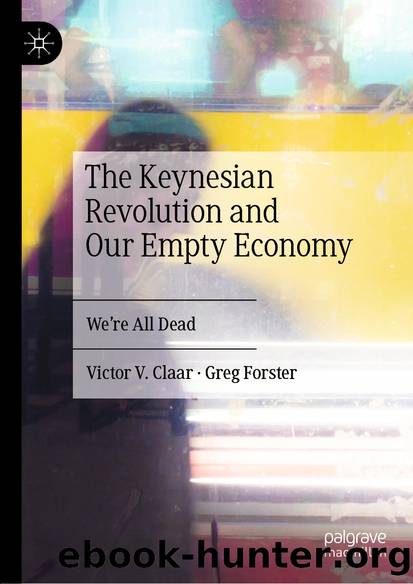The Keynesian Revolution and Our Empty Economy by Victor V. Claar & Greg Forster

Author:Victor V. Claar & Greg Forster
Language: eng
Format: epub
ISBN: 9783030158088
Publisher: Springer International Publishing
The Affluent Society and the Dependence Effect
Galbraith is perhaps best remembered for a series of three books with a simple formula for combining the Keynes and Veblen lines of thought. They offered up a robust Veblenian attack on the sociology of wealth, and argued that a big dose of Keynesian public policy could cure what ails us.
The heart of Galbraith’s argument is that corporations are now so big that consumers are no longer in the driver’s seat in determining what gets produced and at what price. Throughout all three books— The Affluent Society (1958), The New Industrial State (1967) and Economics and the Public Purpose (1973)—Galbraith ridicules the tradition of Adam Smith , in which self-interest leads to the social interest as if by an invisible hand. Against this, he points to the considerable market power and advertising budgets wielded by large corporations. He also paints the market-clearing efficiency of the price system under assumptions of perfect competition as, in the words of Todd Buchholz , “on the same fantastic list as Tinkerbell, Santa Claus, and Snow White” (Buchholz 1989, 188). The myth of consumer sovereignty upon which modern economics so prides itself is akin to the spell placed on Sleeping Beauty—it keeps us asleep, so we don’t wake up to the ways in which advertising has put the big bosses in control.
Madison Avenue advertising executives relentlessly plot to sell you a broad variety of goods and services that are largely indistinguishable from other goods and services that already exist. Buchholz uses this example: You are standing in line to buy a box of Cocoa Puffs cereal. You remark to the person next in line that you really needed that box of Cocoa Puffs, and you really like them. And you are glad they were there when you needed them. But that next person in line turns out to be John Kenneth Galbraith , and his take on your relationship with Cocoa Puffs is dismissive. Galbraith might say to you: You fool! You don’t love Cocoa Puffs, and you definitely don’t need Cocoa Puffs. You have been duped into thinking you need or like or want Cocoa Puffs, but you only think that because a multilevel marketing campaign insidiously suggested to you that you like Cocoa Puffs. In fact, things have gotten so out of hand that you don’t even really know what you need or like or want anymore. You are not free to choose anything: Marketing has decided that for you (Buchholz 1989, 188).
Galbraith’s diagnosis—hard-nosed CEOs hiring expensive advertising executives to convince us we simply must have the absolutely latest and greatest of everything—is not unfounded. As journalist Danny Cross put it: “The toothpaste aisle is the worst. There are only like two toothpaste companies, and they make about 1,000 different types” (Cross 2013). You don’t have to be a wild-eyed Marx ist to see the state of modern marketing as a poor reflection on our moral character.
Galbraith’s solution, however, wasn’t to help the American consumer living in the era of Mad Men become more discerning and self-controlled.
Download
This site does not store any files on its server. We only index and link to content provided by other sites. Please contact the content providers to delete copyright contents if any and email us, we'll remove relevant links or contents immediately.
International Integration of the Brazilian Economy by Elias C. Grivoyannis(57320)
The Radium Girls by Kate Moore(10907)
Turbulence by E. J. Noyes(7037)
Nudge - Improving Decisions about Health, Wealth, and Happiness by Thaler Sunstein(6633)
The Black Swan by Nassim Nicholas Taleb(6190)
Pioneering Portfolio Management by David F. Swensen(5606)
Rich Dad Poor Dad by Robert T. Kiyosaki(5147)
Zero to One by Peter Thiel(4824)
Man-made Catastrophes and Risk Information Concealment by Dmitry Chernov & Didier Sornette(4735)
Secrecy World by Jake Bernstein(3782)
Millionaire: The Philanderer, Gambler, and Duelist Who Invented Modern Finance by Janet Gleeson(3568)
Skin in the Game by Nassim Nicholas Taleb(3459)
The Age of Surveillance Capitalism by Shoshana Zuboff(3422)
The Money Culture by Michael Lewis(3284)
Skin in the Game: Hidden Asymmetries in Daily Life by Nassim Nicholas Taleb(3264)
Bullshit Jobs by David Graeber(3179)
The Dhandho Investor by Mohnish Pabrai(3168)
The Wisdom of Finance by Mihir Desai(3078)
Blockchain Basics by Daniel Drescher(2890)
